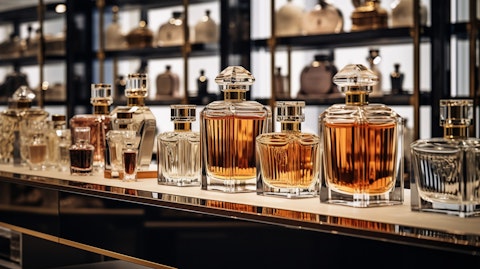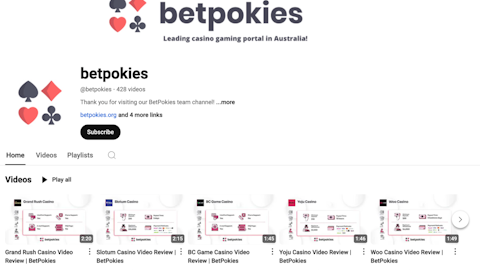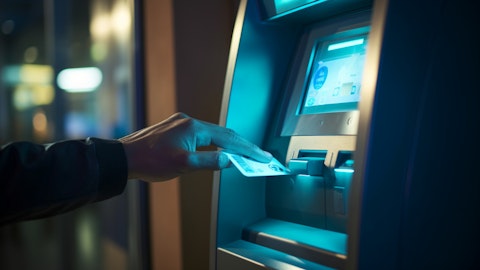We recently compiled a list of the 10 Best Beauty Stocks To Buy According to Short Sellers. In this article, we are going to take a look at where Inter Parfums, Inc. (NASDAQ:IPAR) stands against the other beauty stocks.
The US beauty market, which is seeing major shifts in distribution and customer interaction, continues to be a key area of interest for stakeholders. Beautymatter CEO Kelly Kovack underlined that consumer-driven channels have replaced traditional distribution strategies, compelling companies to engage with customers wherever and whenever they’re most comfortable.
According to a report, the US beauty market is expected to grow to $114 billion by 2027. On the other hand, the prestige channel saw its third straight year of double-digit growth in 2023, rising by 14% to $31.7 billion, outpacing the mainstream market across make-up, skincare, hair, and fragrance, according to the February 2024 CEW conducted annual “Global Trend Report” virtual event. Luxury brands represent the fastest-growing segment, with sales surpassing $16 billion, although being smaller at 11% of the market.
Bigelow Trading’s Daina Nadler emphasized the value of multichannel distribution plans that are customized to a wide range of consumer buying preferences. According to John Cafarelli, CEO of Beautymatter, 87% of US beauty lovers prefer in-store shopping, and 80% of them frequent stores that specialize in beauty products. In-store shopping continues to be popular. In order to increase traffic and loyalty, Space NK’s Noah Rosenblatt and H-E-B’s Jeanne Tamayo stressed the significance of creating compelling retail spaces and solid brand-consumer relationships.
In contrast, although offline retail in China is declining by 4%, e-commerce and social commerce, particularly Douyin, are growing at 9% and 57%, respectively, according to Nielsen IQ. China is a resilient beauty market, and despite all of the difficulties following the pandemic, it remains the world’s second-largest beauty market, posing numerous challenges for international suppliers notes Vice President of Nielsen IQ Gautam Seth. He also points out that local companies are more successful because they employ local ingredients and have a strong cultural connection. Industry giants like Jina Lee of Urang and Kim Da Jeong of Lotte Department Store have stressed the importance of consumer knowledge about ingredients and product efficacy.
The emphasis on diversity is also influencing the global beauty market, although many individuals continue to feel underrepresented in health and beauty advertisements as per Circana. Expectations from consumers about varied representation in terms of gender, color, age, ability, body size, and sexual orientation are at an all-time high. A general market and a multicultural market will not differ by 2044 due to the majority-minority population in the United States. According to a study by SeeMe Index and Circana, brands that are certified inclusive grow 1.5 times faster than brands that are not. Additionally, the likelihood of seeing individuals over 55 in these brands’ advertisements who equally represent straight and homosexual partnerships is 2.5 times higher than that of less inclusive brands, which are 12 times more likely to just feature straight relationships.
Looking ahead, the global beauty market is expected to generate retail sales of over $580 billion by 2027, with an annual growth rate of 6% per report.
One area gaining attention and stimulating beauty business is the growing consumer interest in wellness within beauty. According to a survey on wellness trends in 2024, 82% of US consumers, 87% of Chinese consumers, and 73% of British consumers now rank wellness as a top or important priority in their daily lives. The Goop, one of the “Most Successful Celebrity Beauty Companies in the World,” philosophy is that “beauty is wellness and wellness is beauty.” Beauty firms are entering this space. A massive beauty brand and the Stanford Institute on Longevity have teamed up to develop a new age-reversal technology-powered product.
Methodology:
We sifted through holdings of beauty ETFs and online rankings to form an initial list of 20 beauty stocks. Then we selected the 10 stocks that had the lowest percentage of their shares shorted. The stocks are ranked in ascending order of the lowest percentage of their shares shorted.
Why are we interested in the stocks that hedge funds pile into? The reason is simple: our research has shown that we can outperform the market by imitating the top stock picks of the best hedge funds. Our quarterly newsletter’s strategy selects 14 small-cap and large-cap stocks every quarter and has returned 275% since May 2014, beating its benchmark by 150 percentage points. (see more details here)

A shelf of luxurious perfumes in an upmarket department store surrounded by satisfied customers.
Inter Parfums, Inc. (NASDAQ:IPAR)
% of shares shorted: 1.91%
Inter Parfums, Inc. (NASDAQ:IPAR) is a company that creates, promotes, and distributes fragrances and products linked to fragrances. The product is marketed under various brand names, including COACH, Paul Smith, Bebe, Jimmy Choo, and Abercrombie & Fitch.
The company is divided into two operating segments: operations located in Europe and activities in the United States. Department stores, specialty shops, and perfumeries, as well as local and foreign wholesalers and distributors, are among the clients of the company.
Headwaters Capital Management stated the following regarding Inter Parfums, Inc. (NASDAQ:IPAR) in its fourth quarter 2023 investor letter:
Buys: Inter Parfums, Inc. (NASDAQ:IPAR): Inter Parfums is a leading fragrance house that partners with prestige brands to develop, manufacture, market and distribute perfumes globally under licensing agreements. IPAR was founded in 1982 by Jean Madar and Phillipe Benacin, who collectively own 44% of the company. Both founders are still actively involved in the company with Mr. Madar serving as the CEO of IPAR’s US operations while Mr. Benacin is CEO of the European business, Inter Parfums SA (publicly traded European subsidiary that is 72% owned by IPAR). IPAR focuses on licensing agreements with prestige brands that already have a devoted brand following in categories outside of fragrances. IPAR typically targets brands with fragrances that have either been under-managed or are relatively nascent but have large growth potential via a dedicated fragrance strategy. IPAR’s top fragrance brands include Montblanc, Jimmy Choo, Coach, and Guess. Over the last 2 years, IPAR has added fragrance licenses with Ferragamo, DKNY, Lacoste and Roberto Cavalli, all of which should meaningfully contribute to revenue growth for the company going forward.
The fragrance market is a niche category that requires scale and expertise that is better outsourced to a third party than managed internally by leading brands. The cost to design, market and distribute a fragrance line is too expensive relative to the potential revenue from the product. While top fragrance brands can generate revenue of $1-2 billion, most successful fragrance brands generate revenue in the $10-200mm range. Despite the small size, category extension into fragrances can still be a lucrative business for brands and serves to enhance the value of the brand if managed correctly. As a result, prestige brands often enter into licensing agreements with dedicated fragrance houses such as IPAR to manage their fragrance category. IPAR leverages their internal expertise that is required to design, manufacture, market and distribute a single fragrance over many brands…” (Click here to read the full text)
The fragrance company has expanded effectively since the business was able to get a rich portfolio of licenses. Analysts are bullish that IPAR will continue to expand as a result of new product releases and developments.
Hamed Khorsand of BWS Financial kept his Buy rating on IPAR with a $172 price target, citing the company’s objectives to expand further into the luxury fragrance market in 2025 and its strong Q2 2024 sales recovery by 11% YoY. Khorsand expects stock valuation to rise over the next year based on stable consumer behavior and a positive outlook for IPAR.
IPAR is one of the Best Beauty Stocks To Buy According to Short Sellers, and it has hedge fund sentiments of 18 in Q2 2024. Chuck Royce’s Royce & Associates is the largest shareholder in the company, with 590,830 shares worth $68.55 million.
Overall IPAR ranks 7th on our list of the best beauty stocks to buy according to short sellers. While we acknowledge the potential of IPAR as an investment, our conviction lies in the belief that some AI stocks hold greater promise for delivering higher returns, and doing so within a shorter time frame. If you are looking for an AI stock that is more promising than IPAR but that trades at less than 5 times its earnings, check out our report about the cheapest AI stock.
READ NEXT: $30 Trillion Opportunity: 15 Best Humanoid Robot Stocks to Buy According to Morgan Stanley and Jim Cramer Says NVIDIA ‘Has Become A Wasteland’.
Disclosure: None. This article is originally published at Insider Monkey.





